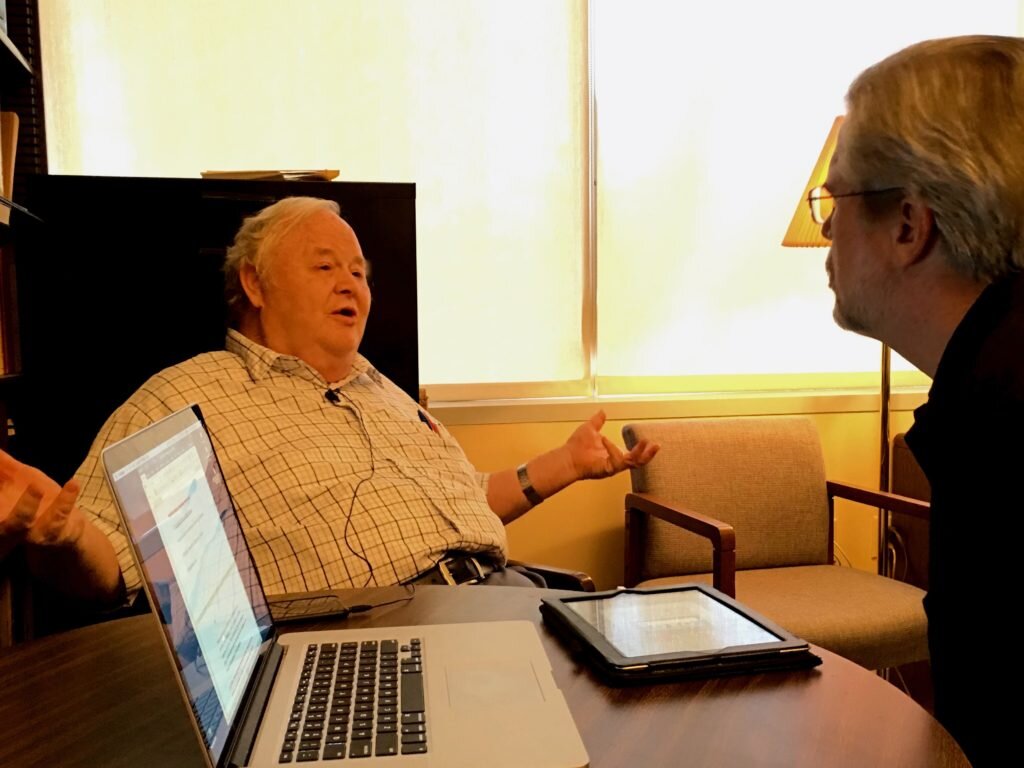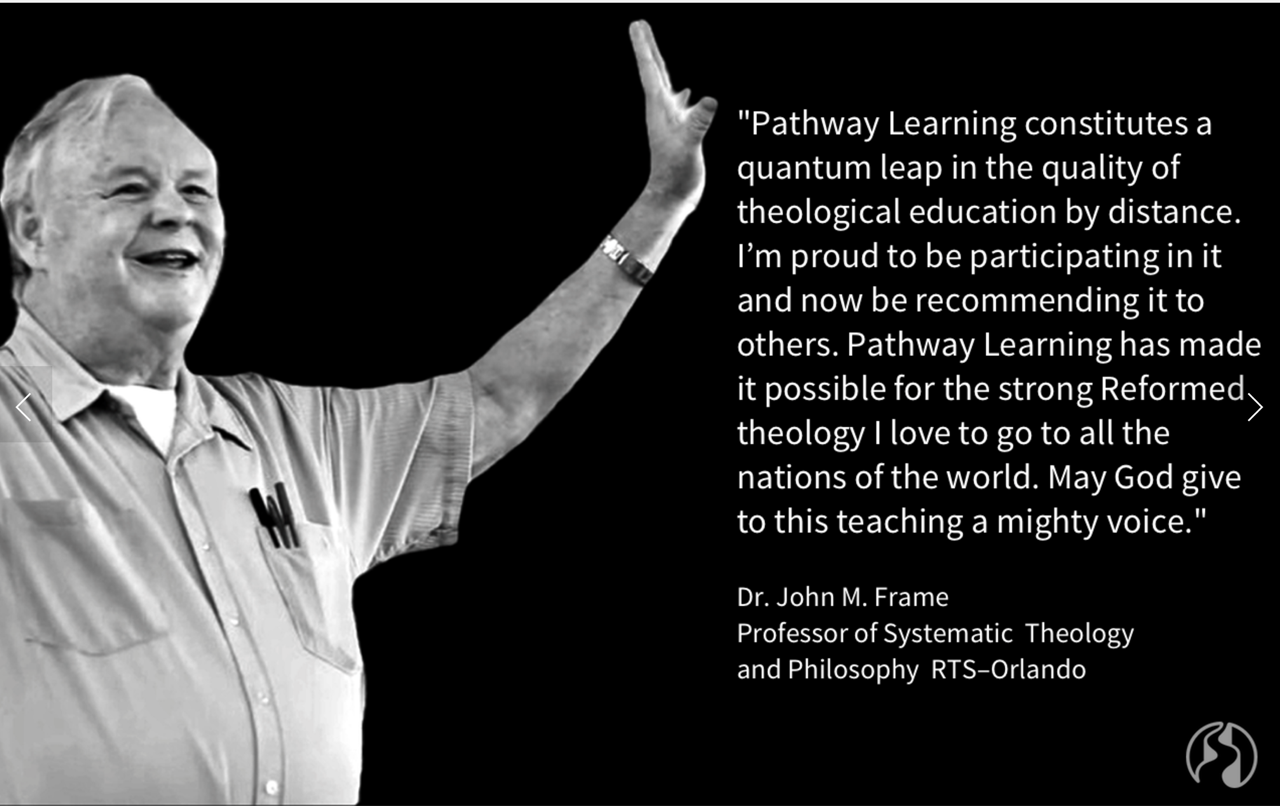Why Study Theology? Excerpt from Childers & Frame Book & Course
John Frame & Steve Childers record Q & A session for Applied Theology Project books and courses
Frame and Childers draw from their more than 70 combined years as seminary professors to help you renew your mind, heart, and life in this excerpt below from the first chapter and lesson in the Applied Theology Project: A Systematic Theologian and a Practical Theologian Apply Theology to Life by John Frame and Steve Childers. Sign up below to receive the latest updates.
So, Why Do We Study Theology?
We saw earlier how theology can be understood as a “study of God,” based on the meaning of the word theology. But the word logos, from which we get the word, theo-logy, conveys not only the idea of the study of God, but also the knowledge of God that is the result of that study. This brings us to a fuller definition of theology as a study of God in Scripture to know God. But how can we, as mere creatures, know the creator? Isn’t it arrogant, or even delusional, even to claim we can know God?Here we raise another foundational pillar in our study of God. The Scriptures teach that God is incomprehensible. Through the prophet Isaiah, God declares his incomprehensible ways:
“For my thoughts are not your thoughts, neither are your ways my ways, declares the Lord. For as the heavens are higher than the earth, so are my ways higher than your ways, and my thoughts than your thoughts (Isa 55:8-9).”
In the New Testament, the Apostle echoes Isaiah when he writes,
“Oh, the depth of the riches and wisdom and knowledge of God! How unsearchable are his judgments and how inscrutable his ways (Rom 11:34-35)!”
Although the Scriptures teach God is incomprehensible, they also teach that God is knowable. Because God is incomprehensible does not mean he is unknowable. Of course, we cannot know God exhaustively and completely. Only God knows himself at that level. But we can still know God. Paul describes his knowledge now in comparison what his knowledge will be like in the age to come:
“For now we see in a mirror dimly, but then face to face. Now I know in part; then I shall know fully, even as I have been fully known (1 Cor 13:12).”
Three Levels of Knowing God
In his classic book, Knowing God, J.I. Packer describes three types or levels of knowing God: 1) knowing about God, 2) Knowing about godliness, and 3) knowing God personally. These three ways of knowing God should not be understood as being contradictory but complementary. You must know about God in order to know about godliness and to know God. But the problem is you can know about God without being truly godly, and without really knowing God.In all my (Steve) years as a seminary professor, I’ve known people who know far more about God than I’ll probably ever know. But I’m deeply sorry to say that some of them did not really know God. I’m not saying they were not sincere followers of Christ. But the testimony of almost all who were close to them, including their closest family and friends, is that they understood and taught the bible very well. But they did not seem to know the God of the bible very well.Just as you can know a lot about a person and their ways and not really know that person, so you can know a lot about God and about godliness, i.e. spiritual disciplines, and not really know God. Our reason for studying theology is not merely to know about God and about godliness, but to know God personally.
Our reason for studying theology is not merely to know about God and about godliness, but to know God personally.
Prior to his conversion, the Apostle Paul knew a lot about God and godliness, he used the term righteousness, but he didn’t really know God. As part of his list of religious accomplishments, Paul included:
… circumcised on the eighth day, of the people of Israel, of the tribe of Benjamin, a Hebrew of Hebrews; as to the law, a Pharisee; as to zeal, a persecutor of the church; as to righteousness under the law, blameless (Phil 3:5-6).
After reciting his prestigious, religious resume, giving clear evidence of his knowledge of God and godliness, Paul says he counts all that knowledge of God and godliness as nothing, in comparison with truly knowing Christ as Lord:
But whatever gain I had, I counted as loss for the sake of Christ. Indeed, I count everything as loss because of the surpassing worth of knowing Christ Jesus my Lord. For his sake I have suffered the loss of all things and count them as rubbish, in order that I may gain Christ and be found in him, not having a righteousness of my own that comes from the law, but that which comes through faith in Christ, the righteousness from God that depends on faith–that I may know him and the power of his resurrection, and may share his sufferings, becoming like him in his death, that by any means possible I may attain the resurrection from the dead (Phil 3:8-11).
A Deeper Knowledge of God
The word Paul uses here for “knowing” Christ is the most common Greek word gnosis that can have a range of meanings according to its context.Sometimes, when Paul wants to convey the idea of a deeper, more full, and intense knowledge, he uses the word epignosis adding the Greek preposition epi to the front of the Greek word for knowledge (gnosis).[1] In Colossians 1:9, Paul tells the Christians at Colossae that he is praying they will be filled with this deeper knowledge, saying:
“And so, from the day we heard, we have not ceased to pray for you, asking that you may be filled with the knowledge (epignosis) of his will in all spiritual wisdom and understanding.”
The deeper knowledge of God’s will Paul refers to here, is not just a general knowledge, but a knowledge rooted in “all spiritual wisdom and understanding.”
Sometimes, when Paul wants to convey the idea of a deeper, more full, and intense knowledge, he uses the Greek word epignosis.
We see this again, in Philippians 1:9, when Paul tells the Christians at Philippi what he is praying for them, using the same Greek word, epignosis:
“And it is my prayer that your love may abound more and more, with knowledge (epignosis) and all discernment (Phil 1:9).”
The deeper knowledge Paul prays will be theirs is not merely a general knowledge, but a knowledge rooted in all discernment. When the Apostle Paul refers to the Jewish people, his dearly loved family and friends, he writes,
“ Brothers, my heart's desire and prayer to God for them is that they may be saved (Rom 10:1).”
Paul then describes the kind of knowledge about God that was held by his beloved Jews:
“For I bear them witness that they have a zeal for God, but not according to knowledge (epignosis). For, being ignorant of the righteousness of God, and seeking to establish their own, they did not submit to God's righteousness (Rom 10:2-4).”
Paul is saying that the Jews have a sincere knowledge and zeal about God and about godliness (righteousness), but it is not a true knowledge of God (epignosis).
Eternal Life is Knowing God
Toward the end of Jesus’ ministry on earth, the Bible tells us He lifted up His eyes to heaven and prayed to the Father on behalf of all His followers, saying,
“And this is eternal life, that they know you, the only true God, and Jesus Christ whom you have sent (John 17:3).”
Although Jesus uses the more common word for knowledge here, gnosis, the context makes very clear that this knowledge of God is the very essence of eternal life–not merely knowing about God, or about godliness–but truly knowing God with a deeper, more personal, saving knowledge, that can only be found in Jesus Christ.Frame summarizes it for us this way: “If you say that theology is ‘knowing God,’ you make it a personal activity, rather than an academic one. Knowing God is something more than knowing about God. It is a personal relationship, like knowing a close friend.”
Don’t miss out on the latest updates on the Applied Theology Project!
[1] J.B. Lightfoot, Saint Paul’s Epistles to the Colossians and to Philemon, London: Macmillan & Company, Limited, 1927, p. 136





